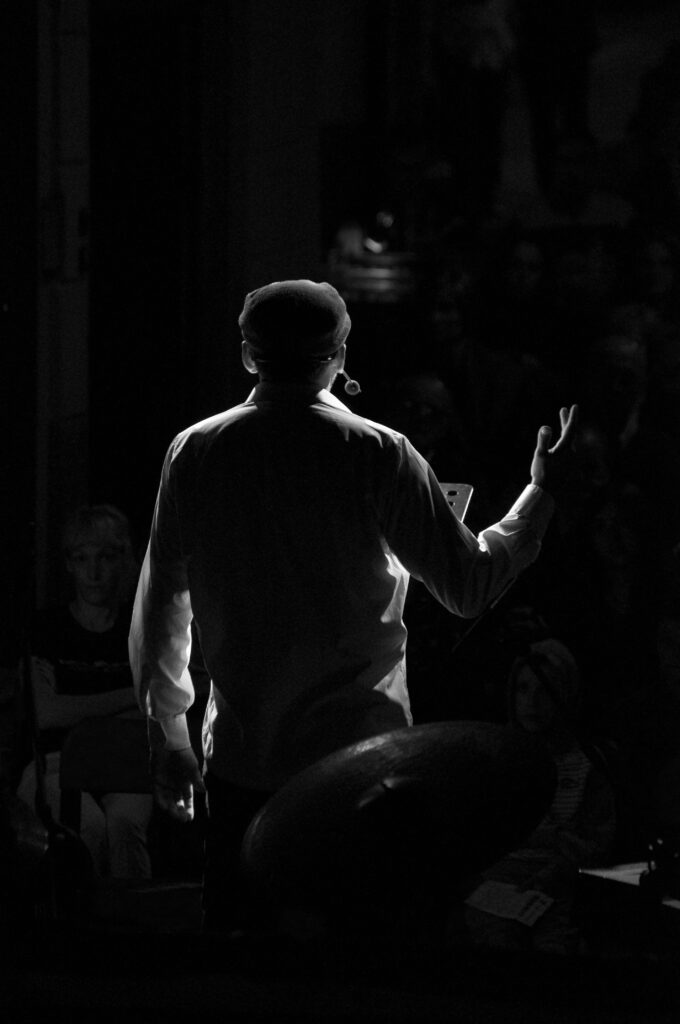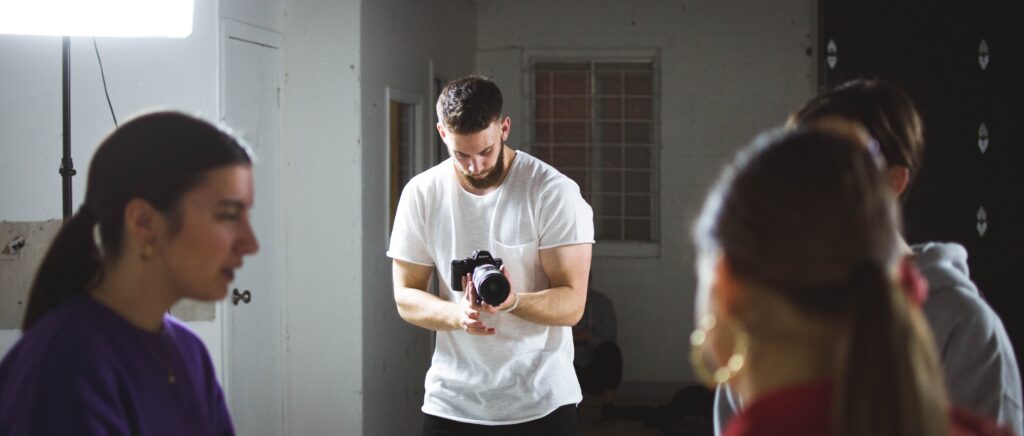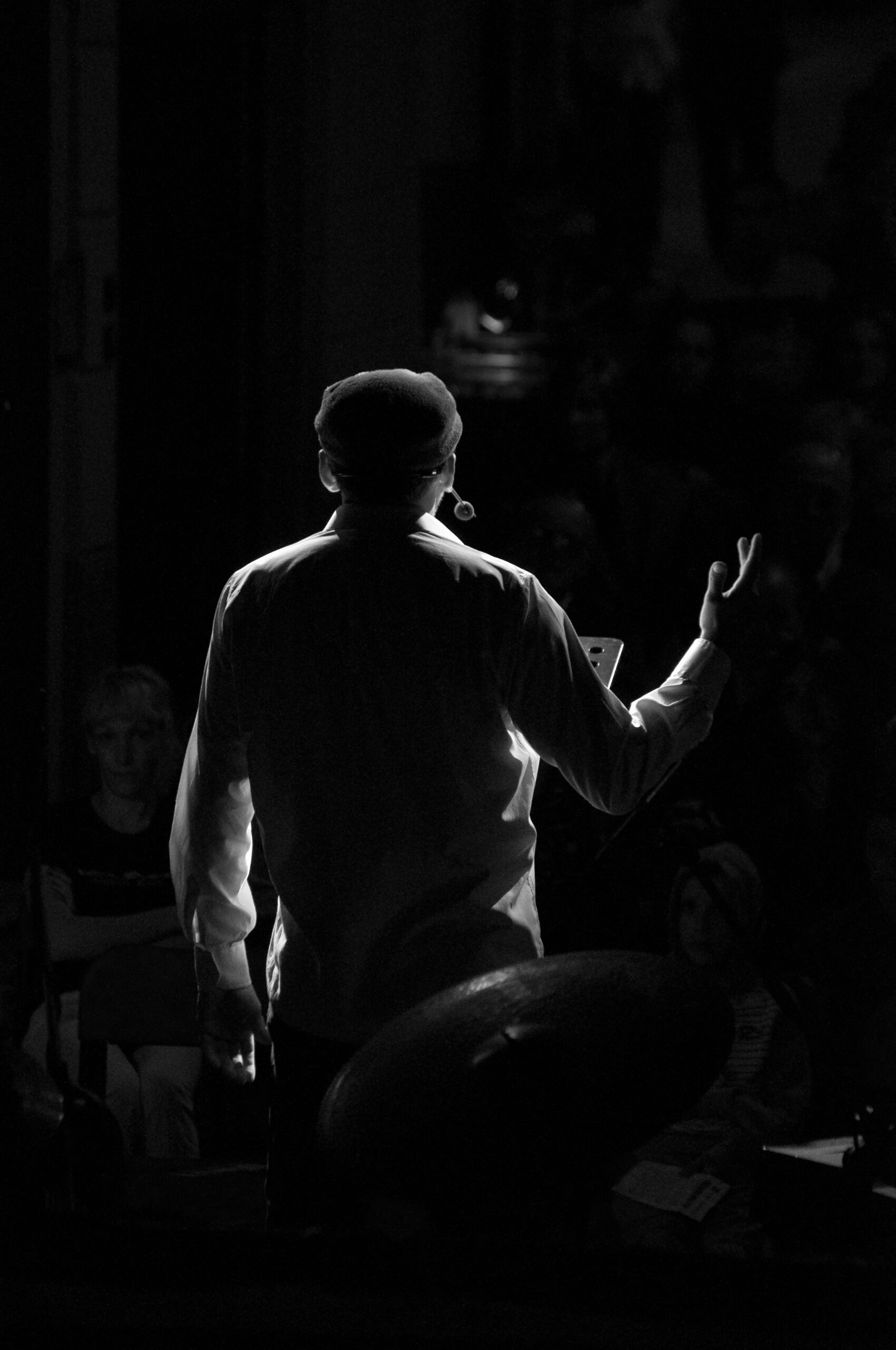Introduction
For introverts looking to step out of their comfort zones, the world of theater offers a unique playground of opportunities. While classic theater provides a structured and predictable environment, improv theatre throws spontaneity and interaction into the mix. This exploration could even be a part of an introvert to extrovert transition, a journey more and more people are finding themselves on nowadays. So, what suits an introvert best? Is it the calm, rehearsed nature of classic theater or the unpredictable, lively spirit of improv? In this article, we’ll delve into both worlds, aiming to give a clear picture of what each entails and how they align with an introvert’s needs. 🎭🤔

Introduction to Classic Theater and Improv Theatre
Classic theater and improv theatre stand at two ends of a spectrum, offering distinct experiences that cater to different tastes and personalities. 🎭 For those who might still be figuring out where they stand on the introversion-extroversion scale, taking our introvert test could provide some valuable insights. Classic theater, on one hand, revolves around scripted performances where every line, movement, and expression is meticulously planned and rehearsed. This genre includes timeless plays and dramas that have stood the test of time, providing a sense of stability and predictability. For introverts, this can translate to a comfortable and controlled environment, where they know exactly what to expect. 📜

On the other end, improv theatre is all about spontaneity and quick thinking. Performers go on stage without a script, relying on their creativity, wit, and audience interactions to shape the performance. This form of theatre is dynamic and can be highly energetic, providing a stark contrast to the composed nature of classic theater. For some introverts, this might sound daunting, but for others, it could be an exciting challenge and a chance to stretch their comfort zones. 🎤
Each type of theatre has its own charm and set of challenges, and understanding these is key to deciding which one might be the better fit for an introverted individual. While classic theater offers a serene and predictable experience, improv theatre brings unpredictability and a livelier atmosphere. This paragraph has set the stage (pun intended), providing a foundational understanding of what classic theater and improv theatre entail, helping readers to navigate through the rest of the article with a clear perspective.
Why Introverts are Drawn to Theater
The theater, with its rich tapestry of stories, characters, and emotions, holds a special allure for many introverts. 🎭 Joining discussions in our intro to extro community can provide further insights into why this art form resonates so deeply with those who typically lean towards introversion. Introverts are often drawn to theater because it provides a space where emotions and thoughts can be explored and expressed in a controlled setting. Classic theater offers a reflective experience, allowing introverts to immerse themselves in the complexities of human nature and the intricacies of storytelling. The scripted nature of these performances provides a sense of security and predictability, making it a comfortable option for those who prefer to know what to expect.

On the other hand, improv theatre presents a different kind of appeal. It introduces an element of surprise and spontaneity, which, surprisingly, can be quite attractive to introverts looking to challenge themselves. The interactive nature of improv also provides a unique opportunity for introverts to engage with the performance in a more direct way, fostering a sense of connection and involvement that is often harder to achieve in other social settings. 🤹♂️
Theater, in its various forms, also offers a sense of community and belonging, which is invaluable for introverts. Being part of an audience, sharing in the collective experience of a performance, provides a sense of unity and connection, all while allowing individuals to maintain their personal space and boundaries. In essence, theater can serve as a gentle bridge, helping introverts to connect with the world around them without feeling overwhelmed. 🌉
In this way, theater becomes a powerful tool for introverts, providing a space for emotional exploration, personal challenge, and community connection, all tailored to their unique needs and preferences.
How Improv Theatre Can Challenge and Reward Introverts
Improv theatre, characterized by its spontaneity and unpredictability, stands as a formidable yet rewarding challenge for introverts. As we delve deeper, those interested in this journey might find our intro to extro roadmap helpful, especially as it offers a unique perspective compared to other guides. In improv, performers and audience members alike must be ready for anything, as the script is created on the spot, and audience participation can play a significant role in shaping the performance.

For introverts, this environment may initially seem intimidating. The fast pace and the need for quick thinking could appear to be at odds with the thoughtful and reflective nature commonly associated with introversion. However, this is precisely where the rewarding aspect of improv theatre comes into play. It provides a safe space for introverts to stretch their boundaries, to engage with spontaneity in a way that is manageable and contained. 🎤
Participating in or even just observing improv theatre can help introverts to develop skills that are beneficial both on and off the stage. It encourages quick thinking, adaptability, and the ability to connect with others in a spontaneous manner. These are valuable skills that can translate to improved confidence and social agility in everyday life.
Moreover, the supportive and collaborative nature of improv theatre fosters a sense of belonging and acceptance. Introverts can find a community of like-minded individuals who appreciate the value of spontaneity and the unique skills that introverts bring to the table. 🤝
Through its unique blend of challenge and reward, improv theatre offers introverts a chance to explore new facets of their personality, to build new skills, and to find a sense of belonging in a lively and dynamic community.
The Benefits of Classic Theater for Introverted Individuals
Classic theater, with its structured narratives and rehearsed performances, presents a sanctuary for introverts. The predictability of the scenes and dialogues offers a comfortable environment, free from the unforeseen surprises that might trigger anxiety for those more inclined to introversion. 🎭 In the realm of classic theater, every word and action is carefully planned, allowing introverted audience members to fully immerse themselves in the experience without the apprehension of unexpected audience participation or deviations from the script.
This genre of theater not only provides a serene viewing experience but also nourishes the introvert’s love for depth and analysis. Classic plays and performances are rich in symbolism, thematic depth, and complex characters, offering ample material for introspection and reflection. Introverts can engage with the content on a profound level, connecting with the characters’ inner struggles and triumphs, and finding solace in the universal themes presented on stage. 📜
Moreover, classic theater provides a communal experience without the demand for social interaction. Introverts can feel a sense of belonging and connection to the audience and the performance, all while maintaining their personal space and internal focus. This balance between community and solitude is a rare and precious commodity for introverts, making classic theater an appealing option.
In addition to the emotional benefits, classic theater also serves as a cultural enrichment tool. It exposes viewers to different time periods, societal issues, and philosophical ideas, contributing to a well-rounded understanding of the world and humanity. For introverts, this aspect of classic theater is particularly enticing, as it aligns with their natural inclination towards learning and reflection.
In these ways, classic theater stands as a valuable resource for introverts, offering a space for emotional connection, intellectual stimulation, and cultural enrichment, all within a comfortably predictable and controlled environment. 🎟
Balancing Solitude and Social Interaction: Tips for Introverted Theater-Goers
Navigating the theater scene as an introvert requires a thoughtful balance between embracing solitude and engaging in social interaction. Understanding one’s own preferences and boundaries is crucial in making the most out of the theatrical experience. 🎭 For introverts, this might mean choosing performances that align with their interests and comfort levels, ensuring a fulfilling and stress-free experience.
One effective strategy is to attend smaller, more intimate performances. These settings often provide a sense of community without the overwhelming nature of larger productions. Additionally, introverts might find that attending matinee performances, which tend to have smaller audiences, allows for a more comfortable and personal viewing experience.
It’s also beneficial for introverts to plan their theater visits with mindfulness towards their energy levels. Ensuring there’s ample time before and after the performance for solitude and reflection can help in recharging one’s mental batteries and enhancing the overall experience. 🤔
While the theater offers a communal experience, it also uniquely caters to the introvert’s need for internal processing. Introverts can engage with the performance on a deep, personal level, allowing for a form of social participation that doesn’t drain their energy. Utilizing the theater as a space for both connection and reflection can lead to a harmonious balance, catering to the introvert’s social needs while honoring their need for solitude.
For introverts wishing to gradually expand their social comfort zone, participating in post-show discussions or joining a theater appreciation group can provide structured social interactions, fostering a sense of community and belonging without the pressure of more spontaneous social settings.
By adopting these strategies, introverted theater-goers can navigate the theatrical world in a way that feels comfortable and rewarding, balancing their love for solitude with the enriching experience of communal art. 🎟🤗
How to Choose the Right Type of Theater Experience as an Introvert
For introverts contemplating a theater outing, selecting the right type of experience is paramount to ensuring enjoyment and comfort. 🎭 Classic theater and improv theatre offer vastly different atmospheres, and understanding these nuances can guide introverts toward the setting that aligns with their preferences and energy levels.
When considering classic theater, introverts should reflect on their appreciation for structure and predictability. This genre offers a controlled environment where performances are meticulously rehearsed, providing a sense of security for those who prefer knowing exactly what to expect. If an introvert finds solace in routine and enjoys delving into intricate storylines and character development, classic theater is an excellent choice. 📜
Conversely, introverts intrigued by the idea of spontaneity and live audience interaction might find a surprising ally in improv theatre. While this setting is undeniably more unpredictable, it also provides a unique opportunity for introverts to engage with performance art in a dynamic way, all within a community that values quick thinking and creativity. It’s a space where introverts can challenge themselves, stepping slightly out of their comfort zones in a supportive environment. 🎤
Regardless of the genre chosen, it’s crucial for introverts to honor their own pace and boundaries. This might mean starting with smaller, more intimate performances, regardless of the theater style, to gauge comfort levels and gradually build up to larger productions if desired.
In addition, paying attention to the timing of the performance can also play a role in ensuring a comfortable experience. Opting for matinee shows or performances during less busy times can provide a more relaxed atmosphere, catering to the introvert’s need for space and tranquility.
By thoughtfully considering these aspects, introverted theater-goers can make informed decisions, selecting the type of theater experience that resonates with their personality and preferences, ensuring a rewarding and comfortable outing. 🎭🎟
Stories from Introverts: Personal Experiences with Classic and Improv Theatre
Diving into the world of theater as an introvert comes with its unique set of experiences and challenges. Listening to stories from fellow introverts who have navigated this journey provides valuable insights and a sense of camaraderie. 🎭 These personal narratives highlight the diverse ways in which introverts engage with classic and improv theatre, showcasing the potential for growth, enjoyment, and self-discovery.
Many introverts find a safe haven in classic theater, drawn to its structured environment and the depth of storytelling. One individual shared how attending Shakespearean plays became a form of meditation, a space where they could connect with complex characters and themes on a profound level. The predictability of the performances provided a comforting backdrop, allowing them to fully immerse themselves in the experience without the anxiety of unexpected interactions. 📜
On the flip side, some introverts have embraced the challenge of improv theatre, finding joy and personal growth in its spontaneous nature. One person recounted how participating in an improv workshop became a turning point in their journey of self-discovery, helping them to tap into a reservoir of creativity and quick thinking they never knew they possessed. The supportive community and the exhilarating rush of live performance helped them to break out of their shell, proving that even introverts can thrive in the world of spontaneous theater. 🎤
These stories underscore the versatility of theater as a medium, highlighting how it can cater to the varied needs and preferences of introverted individuals. Whether finding solace in the contemplative nature of classic theater or embracing the unpredictability of improv, these narratives emphasize that there is a place for every introvert in the theater world, waiting to be discovered and cherished. 🎭📜
Through these shared experiences, introverts can find inspiration and encouragement, knowing that they are not alone in their journey and that the theater offers a welcoming space for all, regardless of where they fall on the introversion spectrum.
Conclusion: Embracing the Theatrical World as an Introvert
Navigating the world of theater as an introvert comes with its unique set of challenges and rewards, but the journey is undeniably worth it. Classic theater offers a sanctuary of predictability and depth, providing introverts with a space to reflect, connect, and immerse themselves in rich storytelling. Improv theatre, with its spontaneity and communal energy, challenges introverts to step out of their comfort zones, fostering personal growth and a sense of belonging.
The key for introverted individuals lies in understanding their own needs and boundaries, choosing the type of theater experience that aligns with their preferences while also being open to the potential surprises and joys that each form of theater can bring. 🎭 Whether drawn to the structured narratives of classic theater or the dynamic interactions of improv, introverts can find a home in the theater, a space where they can both observe and participate, connect with others, and, most importantly, connect with themselves.
Theater, in all its varied forms, provides a unique opportunity for introverts to engage with art, culture, and community on their own terms. By thoughtfully selecting performances, being mindful of their energy levels, and embracing the theater as a space for both solitude and social interaction, introverts can fully enjoy the magic of the theatrical world.
In conclusion, whether it’s the contemplative allure of classic theater or the unpredictable joy of improv theatre, the world of theater has something special to offer every introvert. It’s a world that celebrates diversity, encourages self-expression, and provides a safe space for introspection and connection, making it a perfect playground for introverts looking to explore, connect, and grow. 🎭🤔




